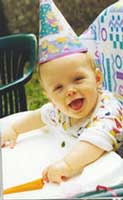How babies learn their first words
A two-year-old can quickly link an object--whether a flashy rattle or a boring latch--to a word. Even a one-year-old can follow a parent's gaze to an object and match it with a word being spoken.

But although anecdotal evidence seems to show that babies younger than one year can learn words, it remains unclear whether they are in fact mastering language. Now a new study reveals that 10-month-old infants can link words and objects, but only if the object is already interesting to them.
Psychologist Kathy Hirsh-Pasek of Temple University and her colleagues tested 44 infants for the ability to learn words. The infants averaged an understanding of nearly 14 words already, according to their mothers.
But the researchers paired four novel objects--a blue sparkle wand and a white cabinet latch, a pink party clacker and a beige bottle opener--with four nonsensical words--modi, glorp, dawnoo and blicket--to test their ability to associate new words with new objects, reports Scientific American.
According to FOX News, Importantly, the babies paired a new word to the object they liked best, regardless of what object the speaker referred to.
"The baby naturally assumes that the word you're speaking goes with the object that they think is interesting, not the object that you show an interest in," Hirsh-Pasek said.
The result is not too surprising, Hirsh-Pasek said in a telephone interview. She says interest drives learning for older children, too, and even adults.
She cites six-year-olds she's heard talking knowledgeably about baseball players' batting averages.
"How in the world do they get it?" she wondered. "They're not going to do decimals until 7th or 8th grade."
"Ten-month-olds simply 'glue' a label onto the most interesting object they see," said Shannon Pruden, a Temple doctoral student in psychology and lead author of a report on the findings in the March/April issue of the journal Child Development.
Later, around 18 months, children learn to use the speaker's interest - such as where the eyes gaze - as a guide to learning, the researchers say.
Still, Hirsh-Pasek thinks there is a lesson for parents and educators of children at all ages.
"Sometimes we fail to take notice of what our learners are doing and what they're interested in," she said. "We all learn best when things are meaningful."
O.Ch.Subscribe to Pravda.Ru Telegram channel, Facebook, RSS!

